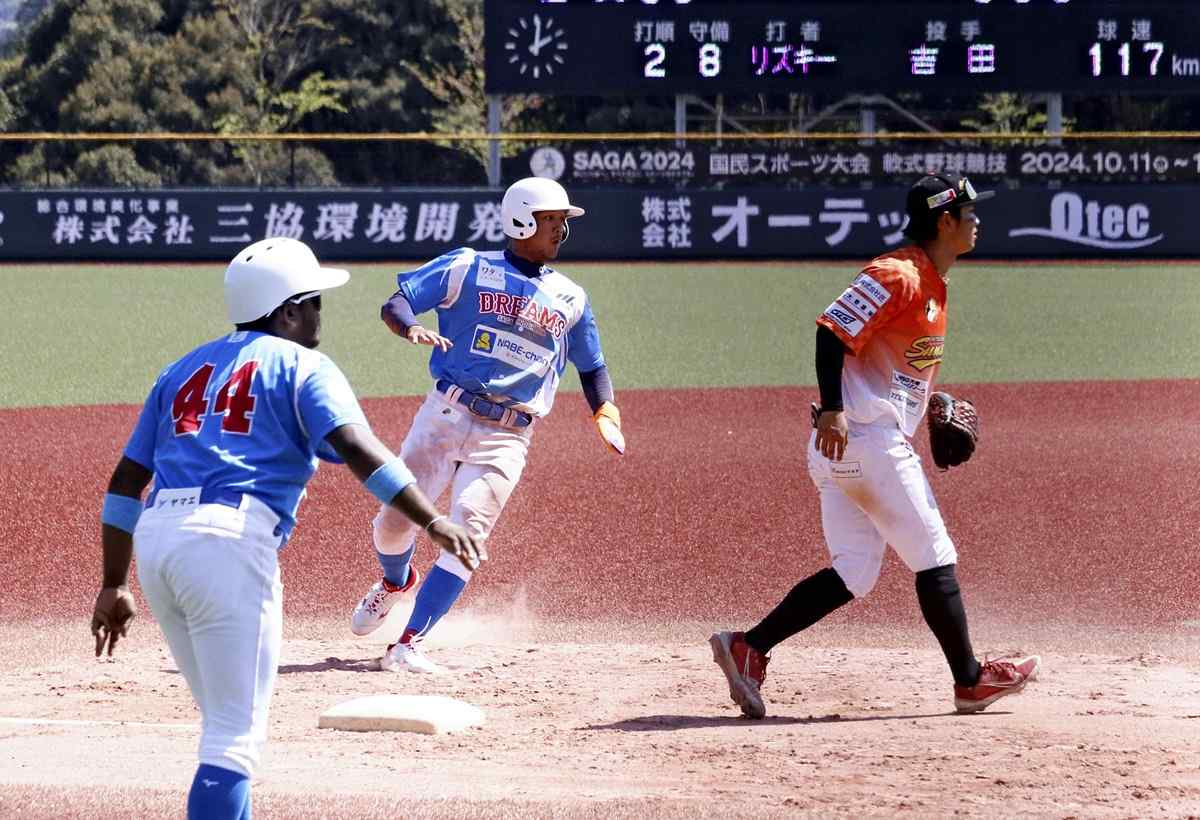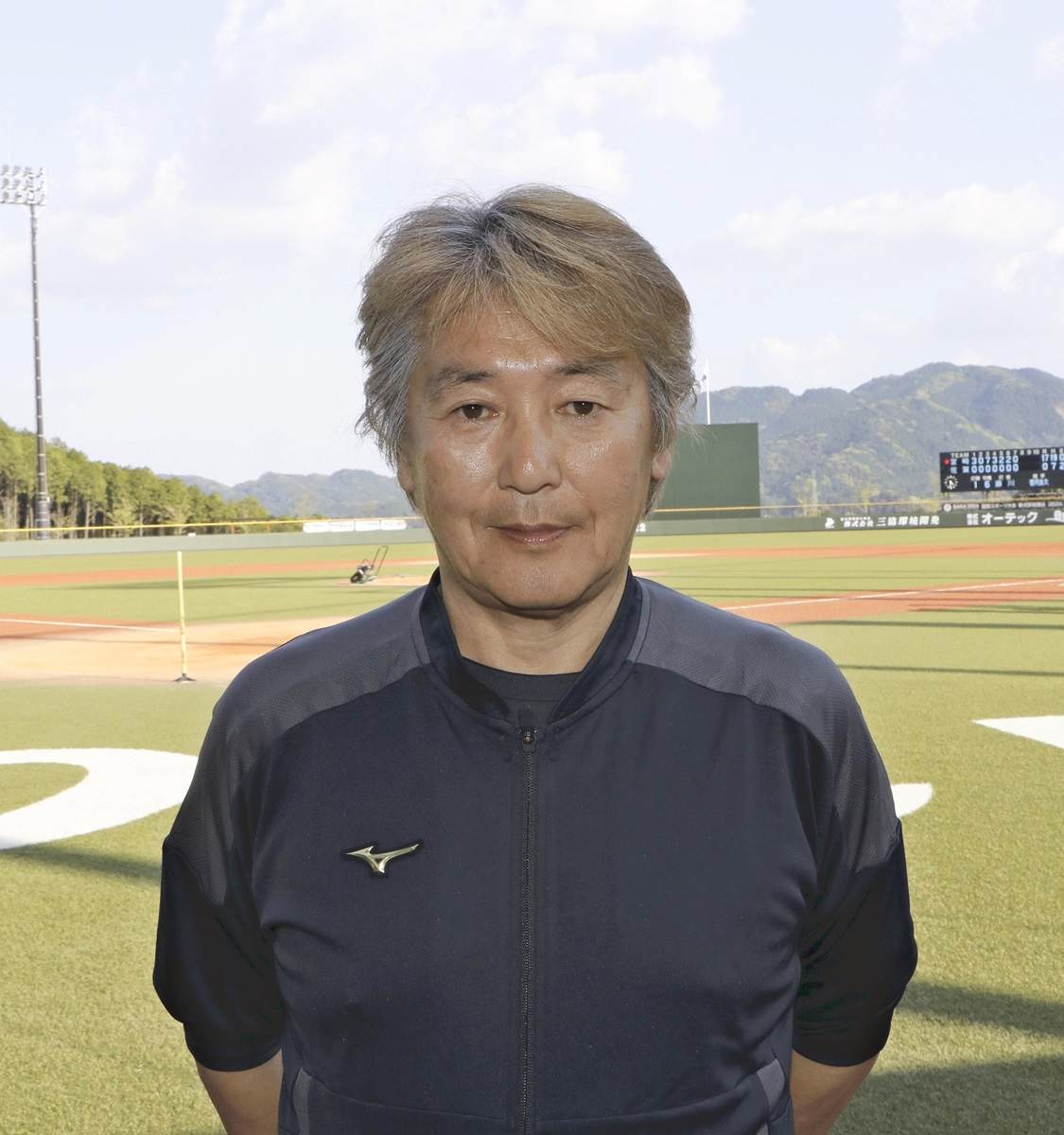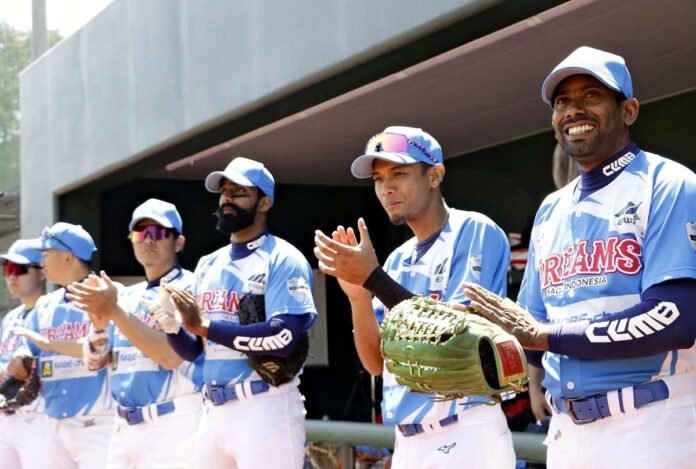Members of the Saga Indonesia Dreams line up on the field in Takeo, Saga Prefecture on April 13.
16:46 JST, June 14, 2024
TAKEO, Saga – A baseball team composed mainly of players from Southeast Asian countries has competed in the Kyushu regional professional league. This season, Saga Indonesia Dreams joined the independent Kyushu Asia League as an associate member. The players pursue their dreams in hopes of promoting baseball in their home country and furthering their own development.
On April 13, the Dreams’ season opener against the Miyazaki-based Miyazaki Sunshines took place at Hizeshin Stadium in Takeo, Saga Prefecture. There were cheers from the Dreams’ bench and stands when their players played well. In the end, the Dreams were routed, 0-17. Still, a total of 3,800 people showed up for the match and an event near the stadium, so there was clearly a lot of interest.

Members of the Saga Indonesia Dreams play in light blue uniforms in the opener against the Miyazaki Sunshines at Hizeshin Stadium in Takeo, Saga Prefecture, on April 13. On that day they suffered a crushing 0-17 defeat.
Yuji Fukuhara, involved in publishing amateur baseball magazines in Japan, took part in activities to promote the sport in Indonesia, which led him to found the team. Fukuhara, now the team’s chairman, decided to join one of the independent leagues in Japan so that the team could compete at a high level.
An independent baseball league is a professional league that is independent of the Nippon Professional Baseball Organization. The Kyushu Asia League, which consists of five teams, is one such competition. Fukuhara decided to base his team in the cities of Ureshino and Takeo in Saga Prefecture because Saga previously had no professional baseball teams and those two cities supported his efforts.
The Dreams’ players and coaching staff currently consist of 24 individuals from Indonesia, Sri Lanka, Singapore and Japan, 19 of whom are foreigners between the ages of twenty and forty. None of these countries, except Japan, have their own professional baseball teams. Therefore, before joining the Dreams, the players from these countries worked as civil servants or corporate employees, while actively playing baseball in local clubs.

Team captain Rizki Ramadhan, a 38-year-old outfielder from Indonesia, learned baseball while living in Japan from ages 9 to 13 because of his parents’ work. Although he dreamed of becoming a professional baseball player in Japan, the lack of opportunities to play baseball after returning to Indonesia led him to give up his dream. While working on a poultry farm, he continued to actively play for the Indonesian national team. It was during this time that he received an offer to join the Dreams and decided to return to Japan, although his wife and children remained in Indonesia.
Ramadhan acknowledges that his time as an active player is limited.
“I would like to learn as much as I can from Japanese baseball and then help young players develop when I return to Indonesia,” Ramadhan said.
Roy Octavianto, a 24-year-old pitcher who was once selected for a state-level team in Indonesia, works primarily as a police officer. He had some reservations about leaving his home country, but he took a leave of absence to come to Japan, hoping to hone his pitching skills.
“One day I would like to play for Indonesia against strong countries like Japan,” he said.
The baseball team’s operations depend largely on revenue from sponsorship deals with local hot springs and other businesses. Players who came to Japan alone live together in a dormitory in Ureshino provided by the sponsoring companies. The players’ contracts run for about six months, until the end of the season, with a salary of about ¥1.5 million.
Saga Prefecture is home to a plethora of tourist attractions and industries, including hot springs, ceramic makers and more. Shoichi Yamashita, the general manager of the baseball team, discussed his intention to gain more support for the team. He said: “Saga has charms that people all over the world can appreciate. This means that we can look abroad for sponsors.”
Fukuhara said: “We would like to support the ambitions of the players who have come to Japan to pursue their dreams. As a team we all want to make these dreams come true.”
For this team, the unprecedented challenge is just beginning.
The team’s scout wants to change the negative image of baseball

Kazuto Nonaka
Kazuto Nonaka, 62, personally scouted all foreign players for the Dreams.
Nonaka is a former manager of the Indonesian national baseball team and even played in the Japanese National High School Baseball Championships. However, during his college years he did not get along with the baseball club and stopped playing professionally or for corporate teams. After graduating, he had various jobs in Japan and the Philippines. In 2001, he moved to Bali, Indonesia, where he devoted his life to coaching baseball while running a tourism business.
In Bali, Nonaka began teaching baseball to local children, who quickly improved their skills under his Japanese-style coaching. He became known nationwide for his coaching, which led to his later appointment as manager of the Indonesian national baseball team.
The athletes playing for the Dreams are promising talents from various countries that Nonaka noticed during his tenure as manager of the Indonesian national baseball team.
“In Southeast Asian countries, baseball is considered harmful to life. I want to put the Dreams on the right track and change that way of thinking,” said Nonaka.



